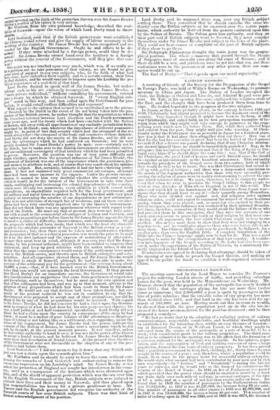eei:STenist Mission.
A meeting of friends of the Society for the Propagation of the Gospel
in Foreign Parts, was had. at Rooms on Wednesday,!to prole* miseiona to China and Japan, The Bishop of. London ocesupied We
chair, the Bishops of Oxford and Lincoln, and Admiral Eeppel werere- .
sent. Dr. Tait, in his opening discourse, explained the religious state of the East, and the, changes that have been produced thee* from Celeste
time. He looked hopefully teethe progress of the true religion. •
In Japan, as they were probably aware, in the century between 15#6 end 1650, Christianity had almost promised to bedoine the dominant eiested'of the country. Very imperfect though it 'might haVe been in its form, it 41111 was Christianity, and called forth on its first peopnglition examPles,4f he- roism from which they might well take courage to pereeveie in the evae- gelizing work which now lay before them. But, while they gathered hope and ecenfort from the past, they might ivellidso take warning. IT Chris- tianity under the Portuguese was so powerful in Japan for a hundred years, how was it that it had since then altemether died out there ? How was it that for the last two centuries so reats had been the hatred of the Japanese towards it that a decree woo passed declaring that Olney. Christian mission- ary showed himself there lie should beinenediately punished? Nay, in its arrogance this barbarian Collet threatened that if the King of Syaiu or Por- tugal came himself he should share the same fate ; nay, that if the God of the Christians, the mat Lord of heaven and earth himself came, he should be expelled as ignominiously as the humblest missionary. This antipathy towards the preachers of the Gospel arose from two causes, both of which they would do well to lay to heart. One was that Christianity had mixed it- self up with political intrigue ; and there was a deep-seated conviction in the minds of the Japanese authoritie.s that those who were ostensibly pro- moting the religion of peace were in reality endeavouring to subvert the em- pire which tolerated them. We must, therefore, let it be distinctly under- stood that when we went to proclaim the Gospel tidings to this people we went as true disciples of Ilierwhose kingdom is not of this world. The other evil which led to the banishment of the Christians from Japan was— shame that they should have to say it !—their quarrels among themselves. Those who were divided sect against seet, and religious order against religious order, could not expect to command the respect of those heathens among whom they were placed; and, as suspicion was excited by theirpo- litieal intrigues so their influence was weakened by their internal disunion. Let them, therefore, remember, if they would avoid the failure of those who had preceded them in this enterprise that they were the servants of one Lord, and endeavour to prove the truth of their religion by that most con- vincing of all arguments, the love which Christians ought to bear to one another. One or two more facts to show that they were not engaging in a hopeless task, and he would give place to those who were better able to ad- dress them. The Chinese Bible could now be purchased, he believed, for a smaller price than even the English Bible. A. complete translation of the Bible into the Chinese language might now be had for 2s. This was a good beginning to make for the evangelization of that vast country. A transla- tion into Japanese of the Gospel according to St. Luke had also been exe- cuted, under the supervision of the Biship of Victoria, by a missionary for- merly employed in the Island of Loo-choo.
Resolutions were agreed to declaring that advantage should he taken of the opening of new lands to preach the Gospel therein, and making an appeal to the public for funds to establish a well-organized mission in China.


































 Previous page
Previous page